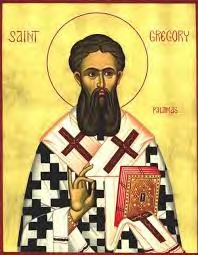 Gregory asks: What if the difference between the Father and the Son, between the unbegotten and the begotten, “is outside the essence”? On a human level, for instance, I can be a father within certain relationships, but my fatherhood is not part of the essence of what it means to be a human being. If it were, as Gregory observes, I would end up being my father’s father, since I would be “the same with him in essence.” Gregory comments that in order to investigate the “nature of the essence of God” might leave issues concerning personality or individuality “absolutely unaffected.” We perhaps are on the right track here, particularly because if we describe God’s nature itself as begotten and unbegotten, we end up with “contradictory essences, which is impossible.
Gregory asks: What if the difference between the Father and the Son, between the unbegotten and the begotten, “is outside the essence”? On a human level, for instance, I can be a father within certain relationships, but my fatherhood is not part of the essence of what it means to be a human being. If it were, as Gregory observes, I would end up being my father’s father, since I would be “the same with him in essence.” Gregory comments that in order to investigate the “nature of the essence of God” might leave issues concerning personality or individuality “absolutely unaffected.” We perhaps are on the right track here, particularly because if we describe God’s nature itself as begotten and unbegotten, we end up with “contradictory essences, which is impossible.
What, however, if the names “Father” and “Son” describe a relationship, a relationship existing eternally in the nature of God?
Father is not a name either of an essence or of an action…. But it is the name of the relation in which the Father stands to the Son, and the Son to the Father. For as with us these names make known a genuine and intimate relation, so in the case before us too they denote an identity of nature between him that is begotten and him that begets.
Both Father and Son share a common essence. They are the same substance homoousios (Gk.ὁμοούσιος). Simultaneously they are eternally distinct in the relationship of Father and Son, unbegotten and begotten. As Gregory puts it, “there never was a time when he was without the Word, or when he was not the Father, or when he was not true, or not wise, or not powerful, or devoid of life, or of splendor, or of goodness.”
As you can tell, the Church’s dogma of the Trinity, which was and is guided by God’s own Spirit, is a difficult idea to conceive and so people like Gregory spent a great deal of time trying to find ways to describe the idea of God. Of course this is why other religions like Islam and Judaism find it impossible to accept this Christian idea of God. This idea of God had to be formulated in order to see Jesus, a man by all appearances, as also God. When the Church decided that Jesus was both God and Man, she had to reformulate the existing idea of God. The existing idea was, of course, from Judaism. In Yahweh there, the Jewish idea of God, there is only ONE PERSON, the Creator.
The beauty of the Christian idea of God is that it connects humankind to God, through Jesus, in an unique and intimate manner. The Christian concept of God bears greater witness to the idea that humans are made in God’s image and unto His likeness.
